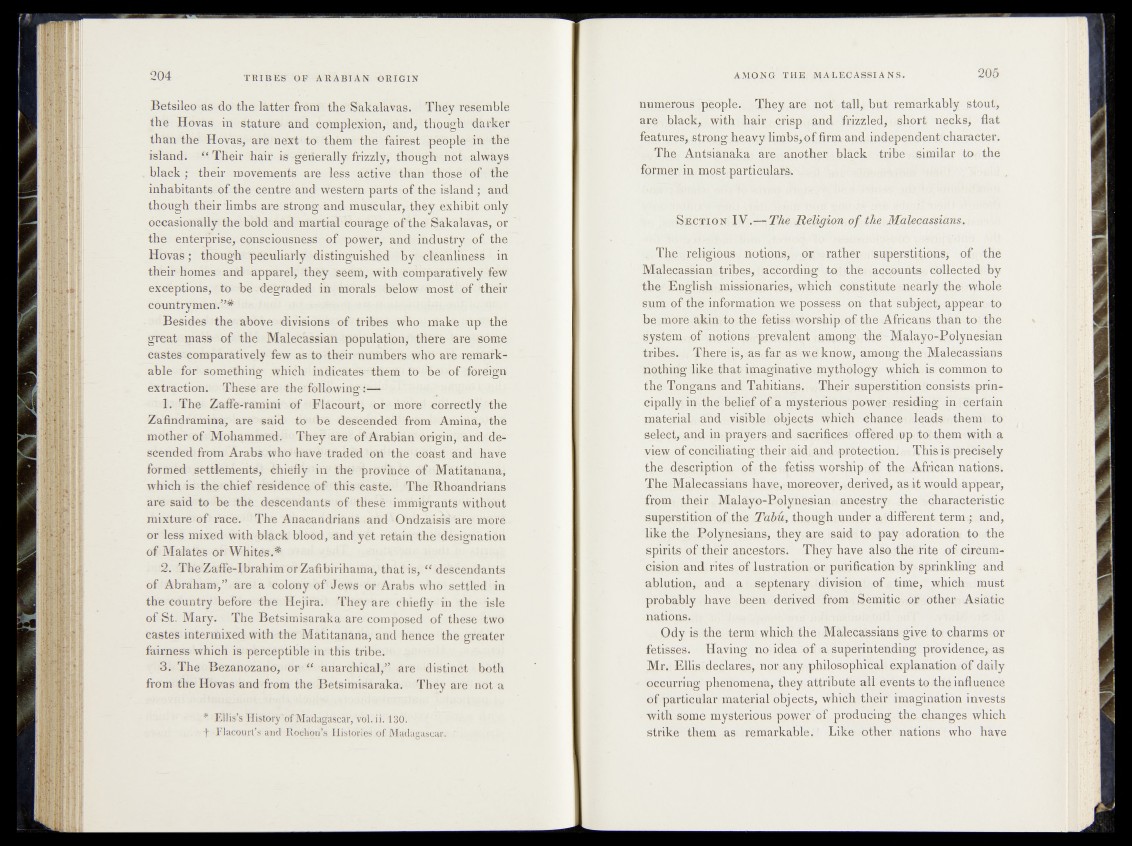
Betsileoas do the latter from theBakalavas; They resemble
the Hovas in stature and complexion, and, though darker
than the Hovas, are next to’ them- the fairest -pèOp'le in the
island. ^ Their hair is federally frizzly^ ftót always
. black ; their movements are less active than thpsë o f . the
inhabitants of the centre'and western parts of the island ; and
though their limbs are strong and muscular, they exhibit only
occasionally the bold and martial courage of the Saka lavas, or
the enterprise, consciousness of power, and industry of the
Hovas; though peculiarly distinguished by cleanliness - in
their homes and apparel, they seem, with comparatively few
exceptions, to be-degraded in morals below most l of *their
countrymen.”*
Besides the above divisions of tribes who make up the
great mass of the Malecassian population, there are ’some
castes^ comparatively few as to their numbers who arë remarkable
for something which indicates" them
extraction. These are the^ïlówingj4tm&
1. The Zaffe-ramini of FlacoUrt, of more3 cöireétl^f€hö
Zafindramina, are said to be descended from Amina, the
mother of Mohammed . They are of Arabian origin, and" dies
seended from Arabs who have traded on the coast and ha Vi
formed settlements,’ chiefly in the proCinée of MatitadanUi
which is the chief residence, of this caste; The Rhoandrians
are said to be the descendants of thesfr iiHfSigrants without
mixture of race. The Anaeandrians and Ondzaisi^iare mètó-
or less mixed with black blood, and yét retain the designation
of Malates or Whites.*
• 2. The Zafte-Ibrahim or Zafibirihama, that is, “ descendants
of Abraham,” are a colony of Jews or Arabs who settled in
the country before the Hejira. They are chiefly in the isle
of St. Mary. The Betsimisaraka are composed of these two
castes intermixed with the Matitanana, and hence the greater
fairness which is perceptible in this tribe.
3. The Bezanozano, or u anarchical,” are distinct both
from the Hovas and from the Betsimisaraka. They are not a
* Ellis's History'ofMadagascar, vol. ii. 130.
■ f Flacourt’s and Rochon’s Histories of Madagascar. '
numerous people;,,. They are not' tall, but' remarkably stout,
are black,; with hair . crisp and frizzled, ? short necks, flat
features, strong heavy limbs,;pf. firm and.independentcharacter.
The Antsianaka are- -another black tribesimilar to. the
former, in most particufarsi
Section 1Y
. The^feligioua,.notions, .or -path#P;; supersriripns, ofrithe
Malecassian tribes, j according to i thtei tapeounts . collected by
the- English missionaries, which construite ^nearly the whole
sjum of the information we- possess 01$* that subjteCty: appeau to
be .rnpse akin to the fetiss* worship of the Africans than to the
system, of notions -prevalent among the Malayo^Polynesian
t^îjÿëSi.,% There iSj^Sifaa asw^^ know, among the .Blalecassians
pothing like that imagfiatiy^ipythology whioh&is* common to
the Tongans and Tahitians, „Their supe^tjrioi^bnrists.prin^
eipailyt in : the belief of a mysterious power'’residing iniëêdiain
material,! and visible objects which chance > leads ; them to
select*and in. prayer g'ïànd saeriheÇPî offêredfHp: to?#iiï®r with: a
view of- conciliating : their aid < and\p$otectioni This is, precisely
th%,description of the ;,fett^; WbPshiprof the African nations;
The Malecassians have,‘mor^ver, derived, as it would appear,
fromt fheir Malayo-PolynesiaU' ancestry? the odharacteristic
superstition of the Tabu, though.under a different term ; and,
like the Polynesians, they;ape :saidto pay adoration to the
spirits of their ancestors. They have also the ^ite ?of eireum-
cision and rites .of lustration, or purification by sprinkling and
ablution, and a septenary, ^division of time, which must
probably have .been derived from ■ Semitic, or other • Asiatic
nations.
Ody is the term which’ thaï Mâfeeassiaaka glva to charms or
fetisses. Having no idea p f ta.tsuperintendifng pcdftdaaee^hs
Mr. Ellis declares, nor any philosophical' explanation; bf daily
occurring phenomena, they attribute aU events to the influence
of particular material objects, which their imagination invests
with some mysterious ■ power" of producing the changes which
strike them as remarkable. ' Like other, nations who have